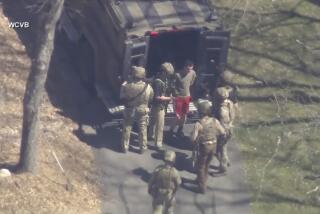Official: NSA did not wiretap Harman
- Share via
COLLEGE PARK, MD — . -- The National Security Agency did not place a wiretap that reportedly intercepted phone conversations made by Rep. Jane Harman (D-Venice), the top U.S. intelligence official said Monday.
Dennis C. Blair, the national intelligence director, declined to say which agency requested the reported wiretap and oversaw the information gleaned from Harman’s conversations. Blair was speaking at the dedication of a new intelligence research facility.
The only other agency that has authority to place wiretaps on calls inside the United States is the Justice Department. It requires court approval.
Media reports have suggested the California congresswoman was overheard in an NSA wiretap seeking lenient treatment for two former pro-Israel activists.
The activists were later indicted on federal charges of unlawfully possessing and disclosing classified information.
Harman has asked the Justice Department to release a transcript of the intercepted phone conversation, which occurred before 2006.
Speaker of the House Nancy Pelosi (D-San Francisco) confirmed last week that she was informed by U.S. government officials that Harman had been overheard on a wiretap.
Pelosi said she did not tell Harman, who has said she first learned of the wiretapping last week from a reporter who had knowledge of the transcript of the recording.
Congressional Quarterly reported last week that Harman was overheard in a National Security Agency wiretap agreeing to seek lenient treatment from the Bush administration for two former employees of the American Israel Public Affairs Committee.
In exchange, according to Congressional Quarterly, prominent pro-Israel contributors would press Pelosi to appoint Harman to the chairmanship of the House Intelligence Committee.
Harman has vehemently denied contacting the Justice Department or White House to intervene in the AIPAC case.
For more than five years after the Sept. 11, 2001, terrorist attacks, President George W. Bush secretly authorized the NSA to intercept phone conversations and e-mails inside the United States.
He did so without the knowledge or permission of a secretive court created by law 30 years ago to oversee just such activities to prevent government abuse of surveillance powers.
Congress adjusted the law last year, both loosening some provisions and tightening others in an effort to balance protecting national security and guarding civil liberties.
The changes allow the government to obtain broad, yearlong intercept orders from the FISA court for the NSA to target foreign groups and people inside the United States.
More to Read
Sign up for Essential California
The most important California stories and recommendations in your inbox every morning.
You may occasionally receive promotional content from the Los Angeles Times.










